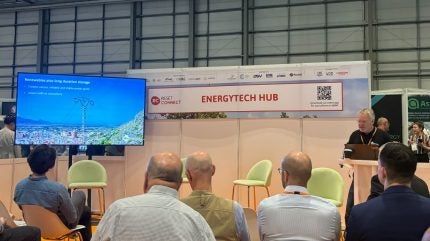
Stephen Crosher, CEO of RheEnergise, advocated for scalable long-duration energy storage (LDES) solutions to support the global energy transition at the Reset Connect conference in London on 25 June.
According to the LDES Council, wind, solar and other renewables are becoming the most cost-effective power generation forms, but they require storage to align supply with demand.
Meanwhile, grids have not kept pace with the exponential growth of renewables in Europe. Unable to manage new capacity, they have served instead as a bottleneck to expanding green power.
LDES has often been broached as the solution. LDES can facilitate the transition to renewable energy in an affordable, reliable and sustainable manner.
The RheEnergise CEO said at the conference that LDES “will win out” with a $4m market opportunity on the horizon, but it currently faces the challenge of low market awareness and rejected project proposals. However, Crosher told Power Technology that “in terms of energy storage, we are just at the very beginning, we are just scratching the surface of the scaling challenge that is so phenomenally big”.
He considers energy storage an asset class instead of a generation or consumption asset, as it currently works as a counterfactual type of technology. However, “when there is lots of demand on the grid, it is supplying your supply; when there is lack of demand on the grid, it is absorbing the excess generation”, which is why recognition is what they seek, he clarified.

US Tariffs are shifting - will you react or anticipate?
Don’t let policy changes catch you off guard. Stay proactive with real-time data and expert analysis.
By GlobalDataAccording to the CEO, deploying demand in cleaner technologies like LDES can make thousands of sites available for projects and grid-scales, pushing up to 100MW of duration support.
“Today, there is [around] 200GW of energy storage capacity in the world. Most of the factories are rapidly deploying, but pump hydro [is] still the vast majority.”
To meet the demands of the energy transition, “we need to increase this capacity to 2TW. This means we need to build ten-times the amount of energy storage,” said Crosher, adding that the deployment rate needs to be 100-times faster than what we have now.
RheEnergies recently announced a 10MW grid-scale project that could operate within two years. In May, the company announced the development of a new and advanced form of long-duration hydro-energy storage system and a “first-of-a-kind demonstrator” at Sibelco’s mining operations at Cornwood, near Plymouth.
The company reported that the storage system, paired with its High-Density Hydro demonstrator, which has a peak power production of 500kW, will assist Sibelco’s mining operations during periods of high energy demand and contribute to the company’s efforts to decarbonise its operations.
Public and private investments
To support LDES projects in the country, the UK Government announced more than £69m ($87.3m) of capital funding available across two competition streams in January 2024. “This could reduce the amount of fossil fuel and low carbon generation that would otherwise be needed and optimise the output from renewables (rather than paying to turn off generators when there is excess supply)”, the statement said.
“It is always helpful to have a bankable market structure,” Crosher says. However, according to the CEO, the mechanism is still very broad for energy assets like LDES, which scale largely. “When you get longer hours, the number of times you can cycle those additional hours becomes quite small. So if the grid needs them, you [must] find mechanisms to pay for that longer duration,” he added.
When asked about the LDES market’s expectations for big companies like bp and Shell, Crosher said that he feels “sorry for them” because they do not care about where they are getting their investment returns from in a timescale that is beneficial for them. He also feels “sorry for them because they don’t have a solution”.
According to the CEO, these companies know of battery or pumped hydro storage as solutions for preserving energy, but RheEnergies provides more options, he says. “I can see viable. We can roll out at scale globally. Our job is to enable the energy majors to transition.”



